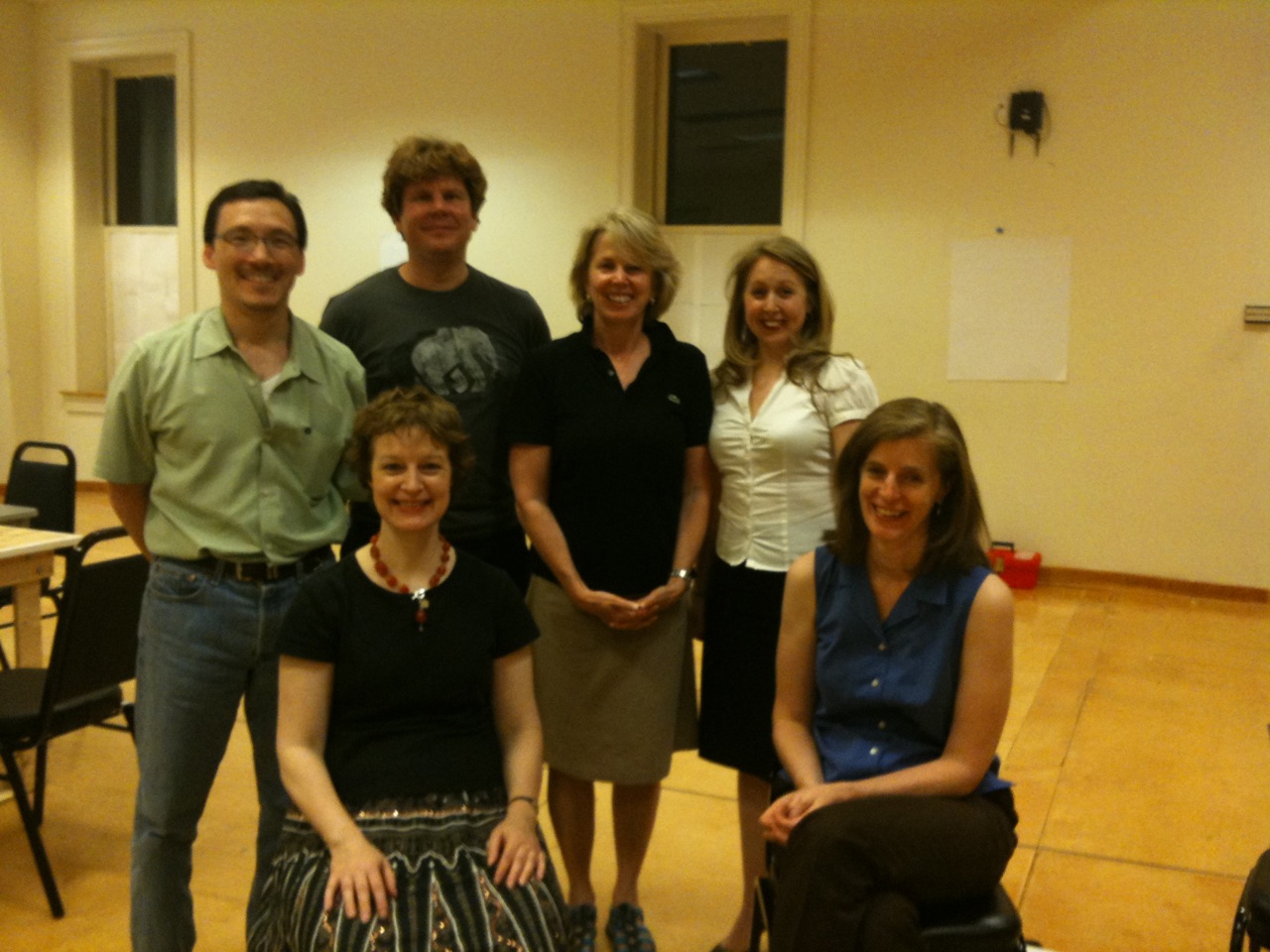
What did I learn about business?
I imagined I’d walk (strut?) away from the course with clever “moves” I could make on a speaking platform. More effective gestures and more confidence in moving around as I speak. I suppose we did learn a bit of that. But the takeaways were much more interesting and they do in fact apply to speaking in business situations. We learned about:
– operative words (the words your listeners need to hear in order to follow your story, especially verbs and nouns)
– knowing your objective (this was a key concept; it means defining the clear, urgent, immediate goal of your speech; what are you trying to accomplish?)
– visualization (you must visualize the emotion and details of your stories and examples while you are speaking)
– obstacles (what lies in the way of accomplishing your goal with your audience? doubt? resistance?)
– point of view (in acting, this is a short visceral phrase like “newly married and in love;” it’s the state of mind from which you speak)
– tactics (what will you do to reach your goal or get what you want out of your speech? persuade? flatter? emphathise? motivate? entertain? scare? bribe? antagonize? piss off?)
What did I learn about acting?
I’ve never done any stage acting and figured it was not something in my repertoire. But with lots of coaching from Vanessa and, frankly, no fear of failure, I mastered one Shakespearean speech: Mark Antony’s Friends, Romans, countrymen from Act III, Scene 2 of Julius Caesar.
For my final presentation I couldn’t resist…
With apologies to Shakespeare, here is my speech to the class. They loved it! (Note: the word ambitious had very negative overtones in Shakespearean usage.)
Friends, Romans, fellow bloggers
Friends, Romans, fellow bloggers, lend me your ears;
I come to blog about Caesar, not to praise him.
Whatever men say online
Lives on forever through Google.
So let it be with Caesar.
The noble Brutus hath told you Caesar desired 5 million Twitter followers
like Oprah and Ashton Kutcher.
If it were so, it were a grievous fault.
And grievously hath Caesar answered it.
For Brutus is an honorable man;
So are they all, all honorable men –
Now come I to live blog Caesar’s funeral.
He was my friend, online and F2F, faithful and just to me.
Caesar has blogged for the Huffington Post
Whose many readers did spread the news of his victories
Did this in Caesar seem ambitious?
When the common man hath left comments on Caesar’s blog
He has responded individually, to each one.
Ambition should be made of sterner stuff.
Yet Brutus says he was ambitious And Brutus is an honorable man.
You all did see that Caesar’s blog ranks number 1 on Google.
I thrice begged him to promote this fact.
Which he did thrice refuse; was this ambition?
Yet Brutus says he was ambitious
And sure, Brutus is an honorable man.
I speak not to disprove what Brutus spoke,
But here I am to blog and Tweet what I do know.
You all did friend him once on Facebook, not without cause
What cause requires you now to de-friend him on Facebook and un-follow him on Twitter?
O Google, thou are fled to brutish beasts,
And men have lost their reason to social networking.
Bear with me;
My heart is in the coffin there with Caesar;
And I cannot blog till it come back to me.
Here is the original speech
Friends, Romans, countrymen, lend me your ears;
I come to bury Caesar, not to praise him.
The evil that men do lives after them;
The good is oft interred with their bones;
So let it be with Caesar.
The noble Brutus Hath told you Caesar was ambitious:
If it were so, it was a grievous fault,
And grievously hath Caesar answer’d it.
Here, under leave of Brutus and the rest –
For Brutus is an honourable man;
So are they all, all honourable men –
Come I to speak in Caesar’s funeral.
He was my friend, faithful and just to me:
But Brutus says he was ambitious;
And Brutus is an honourable man.
He hath brought many captives home to Rome
Whose ransoms did the general coffers fill:
Did this in Caesar seem ambitious?
When that the poor have cried,
Caesar hath wept:
Ambition should be made of sterner stuff:
Yet Brutus says he was ambitious;
And Brutus is an honourable man.
You all did see that on the Lupercal
I thrice presented him a kingly crown,
Which he did thrice refuse: was this ambition?
Yet Brutus says he was ambitious;
And, sure, he is an honourable man.
I speak not to disprove what Brutus spoke,
But here I am to speak what I do know.
You all did love him once, not without cause:
What cause withholds you then, to mourn for him?
O judgment! thou art fled to brutish beasts,
And men have lost their reason.
Bear with me;
My heart is in the coffin there with Caesar,
And I must pause till it come back to me.
– Friends, Romans, countrymen (Mark Antony in Shakespeare’s Julius Caesar)
